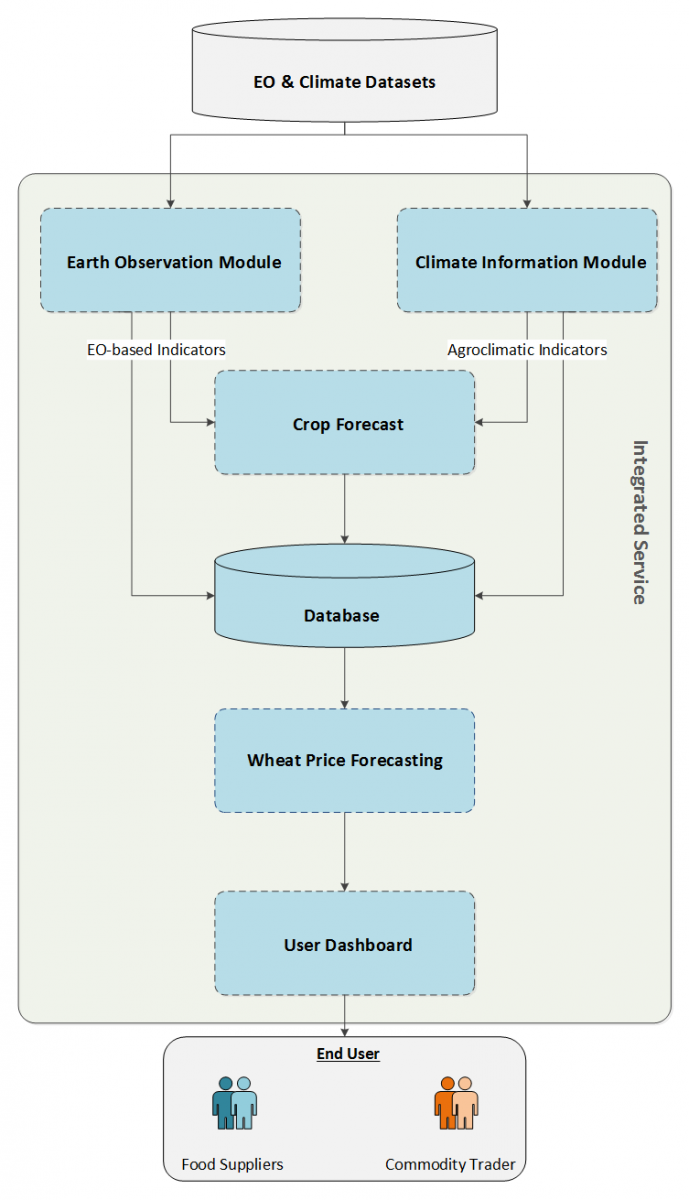
Objectives of the service
The Intergovernmental Panel on Climate Change (IPCC) estimates that by 2050 global crop yields might fall 10-25%; livestock is also at high risk from increased water stress and heat. Food and beverages industries are highly sensitive to these changes in agricultural productivity – typically through impacts on quality, quantity and price.
The aim of CC RAFCo is to provide a flexible solution for food companies and commodity traders to employ Earth Observation (EO) and climate information for better decision making and planning. Although the core focus of the service will be on wheat yield forecast, CC RAFCo will also aim at delivering a wide range of generic vegetation and agroclimatic indicators through an advanced dashboard. This will help maximise the potential uptake of the data for different applications/crops.
Users and their needs
It is crucial to identify the correct stakeholders to capture relevant user requirements. Given Acclimatise’s and Telespazio VEGA UK’s (TVUK) track record with food companies, a starting point for the engagement has been to contact companies we have worked with in the past. The following end users were engaged with during the study through interviews and/or survey:
- Tesco
- Mars
- Marks and Spencer
- Asda
- Ferrero
- Diageo Global Procurement
- Cargill (Corporate Sustainability)
Findings from the interviews and surveys allowed the project team to make an informed decision for finalising the service objectives and concept. The key point that was evident from the responses was that the users stated they would find a seasonal crop forecasting tool and long-term climate impact assessment tool equally useful. While the long-term climate change impact was found useful by the sustainability departments within the food corporations, the sourcing/buying departments showed great interest in a tool that can be used on a regular basis to predict the crop performance for the current season in order to plan for stock shortages or market price hikes. Also, when the users were asked what the most important timescales were to them, the majority stated that seasonal and decadal climate information (i.e. the 2030s) would be most beneficial to them, while few were interested in mid-term timescale (i.e. 2050s).
All engaged stakeholders are multi-national companies.
Service/ system concept
The Seasonal Crop Forecasting tool aims to deliver reliable, regionalised and aggregated crop forecasts to the end users on a weekly or monthly basis. It was envisioned that the tool would provide essential information about a range of crop indicators (e.g. crop yield). This would enable food corporations and their suppliers around the globe to monitor and manage their crops and get a head start over their competitors when it comes to preparing contingency plans and sourcing strategies.
In order to build a sustainable business for such a tool, the team explored avenues for developing it in an existing market base. A suitable route to the market through an existing service has been identified and we have explored possibilities of potential collaboration for a final integrated service.
This integrated service will aim to deliver trade indicators for selected crops to the finance sector.

Space Added Value
Space assets are key enablers for the proposed tool and contribute in different forms. Apart from direct use of EO data previously processed into climate models and seasonal forecasting, optical and radar sensors can be employed in order to obtain an accurate picture of the crop health and maturity, while also differentiating between crop types and assessment of acreage under each crop which can be used for market forecasts.
Space assets therefore will be used in the form of:
- Earth Observation data:
EO datasets will be used to generate generic and crop specific indicators and products including:
- Vegetation Indices
- Crop masks
- Soil parameters
- Climate data:
Climate datasets will be used to generate generic and crop specific agroclimate indicators, including:
- Historical and NRT Agroclimatic Indicators
- Seasonal Forecast Indicators
Current Status
The CC RAFCo Kick Start activity was kicked off in October 2018.
The study completed its Mid-Term Review in February 2019, and the Final Review in June 2019.
A follow-on demonstration project is proposed and the team will now work towards putting together the proposal through the process for ESA Demonstration Projects.
Prime Contractor(s)
Subcontractor(s)



